 In the lead up to this Sunday's Super Bowl XLVIII, an advocacy group calling itself SackNFLTaxBreaks.org announced its formation "to sack the National Football League's anti-fan behavior, its nonprofit tax-free status, as well as the overall government subsidization of the league."
In the lead up to this Sunday's Super Bowl XLVIII, an advocacy group calling itself SackNFLTaxBreaks.org announced its formation "to sack the National Football League's anti-fan behavior, its nonprofit tax-free status, as well as the overall government subsidization of the league."
Co-founded by "New Orleans Saints fan Lynda Woolard" and Ryan Rudominer, "a proud shareholder of the Green Bay Packers, the NFL's only publicly owned team," the group says it hopes to "bring together supporters from associations, nonprofits, unions, corporations, government, journalism, think tanks, academia, the law, and leading advocacy organizations from across the political spectrum."
Their advocacy, to date, is largely built upon a petition launched last year by Woolard calling on Congress to revoke the non-profit, tax-exempt status of the National Football League. Her petition, so far, has obtained more than 300,000 signatures.
On their home page, the group notes that "Despite making $10 billion annually in profits, and paying Commissioner Roger Goodell a whopping $29.5 million dollars-a-year (15 times more than the nonprofit tax-free league gives to charity), the NFL receives a billion dollars annually in government assistance."
The NFL is a separate entity from the individual teams in the league, which do pay taxes. At least two U.S. Senators, Oklahoma Republican Tom Coburn and Maine independent Angus King (who caucuses with the Democrats), have recently "started a push to end" the NFL's non-profit status.
While the movement to end the NFL's special tax breaks is relatively new, the issue of corporate welfare via professional sports has been the subject of previous, blistering critiques...
Author Greg LeRoy, in his aptly named The Great American Jobs Scam (2005), cites Roger Noll and Andrew Zimbalist's Sports, Jobs and Taxes (1997) reveals how professional sports teams, owned by some of the wealthiest Americans, have duped both voters and locally elected politicians into publicly funding stadium and arena construction. As Noll and Zimbalist observed, "independent work on the economic impact of stadiums and arenas has uniformly found that there is no statistically positive correlation between sports facilities construction and economic development." Yet, the teams, citing their own paid economists, have consistently presented claims of jobs creation based upon what LeRoy describes as "faith-based economics."
The result is a drastic enhancement of the values of the privately owned teams.
One classic example involved George W. Bush, who, in 1989, invested $600,000 to purchase a share of the Texas Rangers baseball team. "Bush and his partners," LeRoy observed, persuaded "voters in...Arlington [TX] to approve a sales tax increase to pay more than two-thirds of the cost of a lavish new $191 million stadium and a surrounding development that included an amphitheater, shops, and restaurants. The lucrative deal," LeRoy added, "allowed the Rangers to collect rent from all the nearby facilities."
In 1998, Thomas Hicks, a leveraged buy out billionaire from Dallas, purchased the team for $250 million. A scant nine years after Bush invested the $600,000, he got the mine while Arlington taxpayers got the shaft. His taxpayer-subsidized investment resulted in a sweet $14.9 million profit.


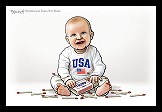 Sunday 'Courting Disaster' Toons
Sunday 'Courting Disaster' Toons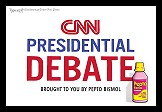 Sunday 'Bad Medicine' Toons
Sunday 'Bad Medicine' Toons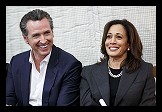 A Friendly Suggestion:
A Friendly Suggestion: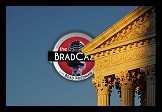 Former Fed Prosecutor: SCOTUS Corruption Ruling Less Corrupt Than Appears: 'BradCast' 6/27/24
Former Fed Prosecutor: SCOTUS Corruption Ruling Less Corrupt Than Appears: 'BradCast' 6/27/24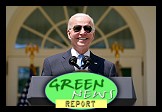 'Green News Report' 6/27/24
'Green News Report' 6/27/24
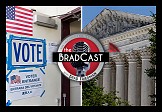 Good News and Bad: At the Polls and From the Corrupted Court: 'BradCast' 6/26/24
Good News and Bad: At the Polls and From the Corrupted Court: 'BradCast' 6/26/24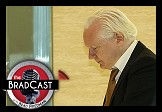 'Not Something Journalists Do': A NatSec Journo on Assange Hacking, Plea Deal: 'BradCast' 6/25/24
'Not Something Journalists Do': A NatSec Journo on Assange Hacking, Plea Deal: 'BradCast' 6/25/24 'Green News Report' 6/25/24
'Green News Report' 6/25/24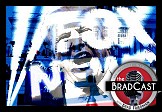 Fox 'News' Grooming Viewers for Another Insurrection: 'BradCast' 6/24/24
Fox 'News' Grooming Viewers for Another Insurrection: 'BradCast' 6/24/24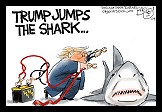 Sunday 'Shark Jumping' Toons
Sunday 'Shark Jumping' Toons The Prophecy and Warning of the White Buffalo: 'BradCast' 6/20/24
The Prophecy and Warning of the White Buffalo: 'BradCast' 6/20/24 'Green News Report' 6/20/24
'Green News Report' 6/20/24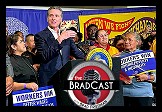 CA Biz Group, WSJ 'Fabricate' $20/hr Fast Food Wage Stats: 'BradCast' 6/19/24
CA Biz Group, WSJ 'Fabricate' $20/hr Fast Food Wage Stats: 'BradCast' 6/19/24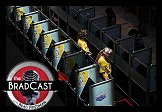 Interference Threats Loom Over November's Presidential Election: 'BradCast' 6/18/24
Interference Threats Loom Over November's Presidential Election: 'BradCast' 6/18/24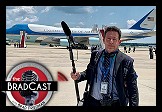 Inside White House Press Corps During Trump/COVID Era: 'BradCast' 6/17/24
Inside White House Press Corps During Trump/COVID Era: 'BradCast' 6/17/24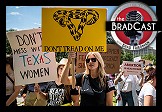 The Corrupt Anti-Abortion TX-to-SCOTUS Legal Mill Pipeline: 'BradCast' 6/13/24
The Corrupt Anti-Abortion TX-to-SCOTUS Legal Mill Pipeline: 'BradCast' 6/13/24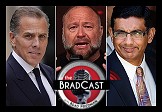 Hunter Conviction; Trump's Weaponized Ignorance: 'BradCast' 6/11/24
Hunter Conviction; Trump's Weaponized Ignorance: 'BradCast' 6/11/24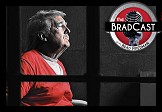 After Trump Verdict, GOPers Suddenly Warm to Voting for Felons: 'BradCast' 6/10/24
After Trump Verdict, GOPers Suddenly Warm to Voting for Felons: 'BradCast' 6/10/24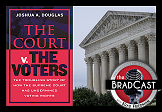 SCOTUS Has Been Undermining American Democracy for 50 Yrs: 'BradCast' 6/6/24
SCOTUS Has Been Undermining American Democracy for 50 Yrs: 'BradCast' 6/6/24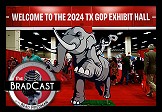 What Happens in Texas Does NOT Stay in Texas: 'BradCast' 6/5/24
What Happens in Texas Does NOT Stay in Texas: 'BradCast' 6/5/24
 VA GOP VOTER REG FRAUDSTER OFF HOOK
VA GOP VOTER REG FRAUDSTER OFF HOOK Criminal GOP Voter Registration Fraud Probe Expanding in VA
Criminal GOP Voter Registration Fraud Probe Expanding in VA DOJ PROBE SOUGHT AFTER VA ARREST
DOJ PROBE SOUGHT AFTER VA ARREST Arrest in VA: GOP Voter Reg Scandal Widens
Arrest in VA: GOP Voter Reg Scandal Widens ALL TOGETHER: ROVE, SPROUL, KOCHS, RNC
ALL TOGETHER: ROVE, SPROUL, KOCHS, RNC LATimes: RNC's 'Fired' Sproul Working for Repubs in 'as Many as 30 States'
LATimes: RNC's 'Fired' Sproul Working for Repubs in 'as Many as 30 States' 'Fired' Sproul Group 'Cloned', Still Working for Republicans in At Least 10 States
'Fired' Sproul Group 'Cloned', Still Working for Republicans in At Least 10 States FINALLY: FOX ON GOP REG FRAUD SCANDAL
FINALLY: FOX ON GOP REG FRAUD SCANDAL COLORADO FOLLOWS FLORIDA WITH GOP CRIMINAL INVESTIGATION
COLORADO FOLLOWS FLORIDA WITH GOP CRIMINAL INVESTIGATION CRIMINAL PROBE LAUNCHED INTO GOP VOTER REGISTRATION FRAUD SCANDAL IN FL
CRIMINAL PROBE LAUNCHED INTO GOP VOTER REGISTRATION FRAUD SCANDAL IN FL Brad Breaks PA Photo ID & GOP Registration Fraud Scandal News on Hartmann TV
Brad Breaks PA Photo ID & GOP Registration Fraud Scandal News on Hartmann TV  CAUGHT ON TAPE: COORDINATED NATIONWIDE GOP VOTER REG SCAM
CAUGHT ON TAPE: COORDINATED NATIONWIDE GOP VOTER REG SCAM CRIMINAL ELECTION FRAUD COMPLAINT FILED AGAINST GOP 'FRAUD' FIRM
CRIMINAL ELECTION FRAUD COMPLAINT FILED AGAINST GOP 'FRAUD' FIRM RICK SCOTT GETS ROLLED IN GOP REGISTRATION FRAUD SCANDAL
RICK SCOTT GETS ROLLED IN GOP REGISTRATION FRAUD SCANDAL VIDEO: Brad Breaks GOP Reg Fraud Scandal on Hartmann TV
VIDEO: Brad Breaks GOP Reg Fraud Scandal on Hartmann TV RNC FIRES NATIONAL VOTER REGISTRATION FIRM FOR FRAUD
RNC FIRES NATIONAL VOTER REGISTRATION FIRM FOR FRAUD EXCLUSIVE: Intvw w/ FL Official Who First Discovered GOP Reg Fraud
EXCLUSIVE: Intvw w/ FL Official Who First Discovered GOP Reg Fraud GOP REGISTRATION FRAUD FOUND IN FL
GOP REGISTRATION FRAUD FOUND IN FL


































